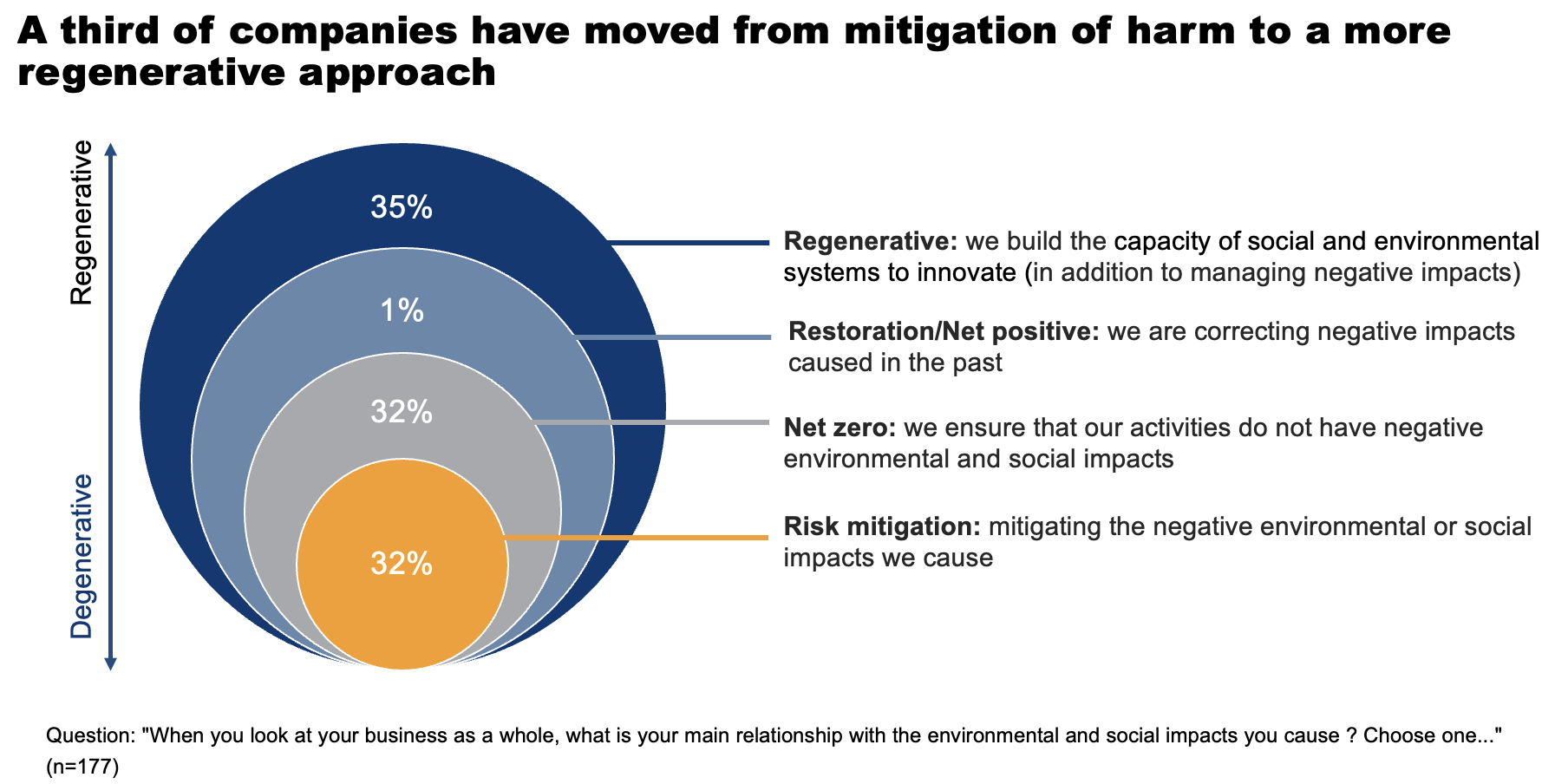According to the latest FIBS Sustainability in Finland Survey, sustainability is already driving innovation and investment, but companies still persist with unsustainable business practices: 63 percent of enterprises have made investments in sustainable development in the last three years and almost as many (59%) have made innovations. Yet only 16% have abandoned unsustainable business practices, and even fewer (13%) have removed unsustainable alternatives from their product or service portfolio.
The vast majority (64%) of companies surveyed continue to focus their sustainability efforts on reducing risks and ensuring that their business activities do not have a negative impact on the environment and society.
However, at the same time, up to 35% say they have already moved from minimising the negative impacts of business to a more regenerative business approach, in which, in addition to managing impacts, the company’s actions create the capacity for social and environmental systems to recover and thrive.
”Regenerative business is only just emerging in management debates. This is why I believe that this positively surprising result sends a particular message about the willingness and ambition of companies to contribute to the well-being and resilience of society through their own actions. This is a good place to continue the debate on the principles, conditions and means of regenerative business,” says Helena Kekki, Director of FIBS.
The war in Ukraine and the pandemic reinforced companies’ commitment to sustainability
Contrary to expectations, the global political situation in 2022 – the war in Ukraine, the Corona pandemic and the energy crisis – has not weakened Finnish companies’ commitment to sustainability: 72 percent of the companies surveyed said the crises had strengthened their commitment to sustainable and responsible business.
Indeed, Finnish companies are currently well placed to make an impact: corporate responsibility is strongly reflected in corporate strategy and the agenda of senior management, and its importance and benefits are recognised. But while a large number of companies are committed to international frameworks for sustainability, there is still much to be done in terms of the practices that support them:
- More than half of companies have not yet set nature objectives or a net zero emissions target in accordance with the Paris Agreement.
- Less than 40 percent have identified human rights risks in line with the UN guiding principles or carry out an ongoing due diligence process.
- Less than half also report on climate, nature or human rights in a quantitative and annual format, and almost less than half (45%) publish relevant sustainability-related financial information according to a reputable framework (e.g. TCFD).
The role of political influence in promoting sustainability is not yet recognized by companies
A surprisingly high number of people do not know their company’s position or approach to lobbying for sustainable development: as many as 57% do not know their company’s position on advocacy organisations promoting unsustainable policies and just over a third (36%) do not know what kind of political lobbying their company does.
“Regulation creates a stable, predictable and fair environment, which is essential for business investment, competition and success. At present, it appears that political influence promoting sustainable change, its possibilities and effects have been left behind in sustainability efforts. Companies should therefore be more supportive of policies and regulations that promote sustainable change, because they have more leverage in this area than has been realised so far,” Helena Kekki concludes.
The main challenges for companies in the future are a lack of skills and resources: only 6% of companies consider their skills to be sufficient in relation to their corporate responsibility objectives, and only one in ten consider their resources and measures to be sufficient in relation to their corporate responsibility objectives.
Survey
The Sustainability in Finland 2023 survey provides a comprehensive overview of the corporate responsibility practices, challenges and future prospects of large and medium-sized Finnish companies. 184 CEOs and corporate responsibility directors and managers from Finland’s 1,000 largest companies, as well as from the most important cooperatives and other operators, participated in the survey. The survey was conducted by telephone and email between 14.10.2022 and 25.1.2023. The survey was carried out by Innolink. FIBS has been conducting the survey since 2013. The previous survey was carried out in 2021.
- Summary: Sustainability in Finland 2023 Survey
- Report: Sustainability in Finland 2023 Survey (available to FIBS members)
More information
Helena Kekki, Director, FIBS, +358 50 3451 966, helena.kekki@fibsry.fi
FIBS is the largest corporate responsibility network in the Nordic countries, a leading promoter of sustainable business and developer of responsibility expertise. We help combine responsibility and business on a practical level. Read more


